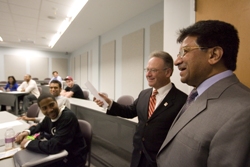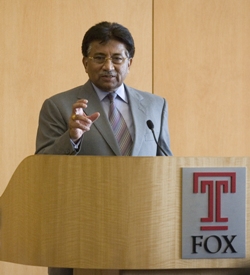Fox hosts former Pakistani president
|
Temple University and the Fox School of Business on Friday hosted the former president of Pakistan, who toured the business school’s new home and held an informal discussion with MBA students about global economic and political issues. Retired Gen. Pervez Musharraf, whose post as Pakistan’s 10th president was once called “the world’s toughest job” by Time magazine, was greeted by university President Ann Weaver Hart, Fox Dean M. Moshe Porat and some members of the university Board of Trustees and the Fox School Board of Visitors. After a walking tour of Alter Hall, the Fox School’s new $80 million facility, Musharraf continued on to a private luncheon with select faculty and civic and business leaders. There, he touched on topics of political turmoil, terrorism and global economic inequities. |
 Photos by Ryan S. Brandenberg/
Temple University As part of a walking tour during his visit to Alter Hall, former Pakistan President Pervez Musharraf (foreground) visited an undergraduate class with Fox Dean M. Moshe Porat.
|
|
During opening remarks at the luncheon, Musharraf said he was “extremely impressed” with the Fox School and “the spirit everyone here shows” to philanthropy and encouraging education through personal support. Raza Bokhari, a Fox School Executive MBA graduate and chairman of the school’s Board of Visitors Executive Committee, facilitated Musharraf’s visit to Fox. Bokhari, a native of Pakistan, donated $1 million to the Fox School and its Innovation and Entrepreneurship Institute suite during the construction of Alter Hall. After the luncheon, Musharraf joined about 100 Fox MBA students and staff for an informal question-and-answer session on the seventh-floor MBA Commons. During the hour-long discussion, Musharraf answered questions on topics ranging from nuclear proliferation and foreign investment to the relationship among politics, economics and law. |
|
 Former Pakistan President Pervez Musharraf addresses Fox School of Business MBA students and staff during an informal question-and-answer session.
|
“I feel the economy is the backbone of anything you want to do for a country — anything,” Musharraf said during the discussion. Musharraf, who became president in 1999 after a military coup, led Pakistan until his resignation in August 2008. His successor, Asif Ali Zardari, the widower of slain former Prime Minister Benazir Bhutto, took office in September 2008. The former president told students that he took office knowing little about economics but quickly realized that he needed to focus on core issues — such as closing the gap between expenditures and earnings, expanding Pakistan’s tax base and encouraging investment — without getting stalled by jargon. “Really, the issues are not as complicated as the terms that they [economists] use,” he said. |
|
Musharraf emphasized that he set end objectives and overall strategies to attack problems before focusing on specific tactics during his time as president. In telling students to consider doing the same, Musharraf said he “could have never imagined in my wildest dreams” being president or army chief. “Remember that one never knows where destiny will take them,” he said. Full-time MBA students Andrew Martel and Dhaval Parekh, who both posed questions to Musharraf, said it was the first interaction they’ve had with a head of state. Martel and Parekh credited Musharraf with inviting “frank and honest” questions and answering each inquiry – even if it wasn’t the answer they wanted. “I was bowled over that we got such a high-profile world figure,” Martel said. Added Parekh: “I was absolutely shocked.” Porat said the opportunity for students to speak with a world leader was the latest example of the range of experiences a Fox education can provide. “The Fox School is all about practical application and global learning,” he said. “In this instance, our strong connection with alumni allowed us to give current students what may be an experience of a lifetime. In speaking with President Musharraf, our MBA students learned more about what makes a leader – and what they can do to become one.” |
|